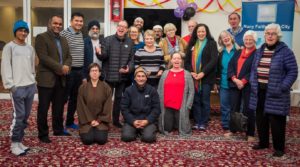Scholars, religious leaders and people involved in their communities and in Interfaith dialogue came together from around New Zealand, Australia and the USA to discuss the theme of “Freedom to Do, to Be, and to Become: Enhancing Individuals’ Opportunities to Believe and Live as They Choose Within the Framework of the Law”[1].
While it seemed like most presenters were Law professors and other academics the two co-presidents of the Auckland Inter-Faith Council were also invited to give a presentation. Ram Lingam spoke from a Hindu perspective in the first panel, and Beate Matthies spoke about the Auckland Inter-Faith Council at the final panel of the conference.
It was inspiring to see the thought and expertise from years of studies that went into all presentations of the Conference.
The idea of a “Human Family” and the key words of value and respect kept coming up again and again – as well as a typical New Zealand comment: there is a 4th (oral) article of the Treaty of Waitangi (1840) that protects Freedom of Religion in this land.

Religious Freedom & Founding Documents
Religious Freedom is part of many founding documents around the world. At the end of the American Revolution, Thomas Paine (1776) was quoted with: “As to religion, I hold it to be the indispensible duty of every government, to protect all conscientious professors thereof, and I know of no other business which government hath to do therewith.” (see also First Amendment to the U.S. Constitution).
However, there is something special about the Treaty of Waitangi, Te Tiriti o Waitangi, and about New Zealand Law. It is based on value. The fourth article of this founding document was submitted by Bishop Jean-Baptiste Pompallier, the first Catholic Bishop of the country. Bishop Pompallier not only wanted to make sure that Catholics were not discriminated against, but also that there was a guide on how to live together peacefully: “Nā tō rourou, nā taku rourou
ka ora ai te iwi.” (With your food basket and my food basket the people will thrive.)
New Zealand’s founding document is described as a covenant between the Māori people and the Crown. This covenant, based on religious values, was “made in trust”.
On Waitangi Day, a common prayer includes: “Ever-living God, we pray for the people of this land, for the Māori people, the Tangata Whēnua, for the Pākeha people, for the honouring of their covenanting together in the Treaty of Waitangi…”
Religious Freedom needs to be seen as a cornerstone of peace and understanding. In this sense, conscience and a sacred belief are core values. Therefore, as Melissa Sweeny reiterated, it is important to have a “Culture of Respect and Understanding”, and to stand up against bigotry, violence and hate.
Charities Law
Some elements of Freedom of Religion are often undermined and are easy targets for conspiracy theories, said Dr Juliet Chevalier-Watts.
Terms are often misunderstood or confused, for example “equal right” and “privilege”.
A privilege goes beyond equal rights. It would be a privilege if someone is exempt from paying taxes. In fact, this is a privilege given to charities and churches.
However, research has shown that, in general, religion is good for society. Religious groups look after minorities and safeguard them.
How should the charity status be applied? It certainly should not depend on the popularity of an organisation. There should always be a social approach and a benefit for the society.
The financial worth in the work of charities is surprising: it is estimated that the amount is in the trillions for the USA and for New Zealand, the current calculation sits at $6.1 billion but only really scratches the surface.
Other speakers raised further issues regarding the Charity Law, especially concerning the redress for abuse in care, tax exemption and advocacy work (and discrimination).
For example, the redress for abuse in care has become a topic of debate for the charity status of charities involved. The suggestion was raised to revoke the charitable status or to stop any Government support if a charity didn’t want to sign up for funding the redress scheme.

Rights & Duties
Religious Freedom is often seen as “your rights and my duty” rather than acknowledging that “your right actually creates a network of duties”. Brett G. Scharffs connected the rights with duties, responsibilities and values.
As all rights have limitations, everyone has to exercise his or her rights responsibly.
The challenge is to develop a character that values Religious Freedom.
According to Aristotle, there are three principles: ethos, pathos, and logos. These principles could be transformed into three Habits of Character:
1. The Head. Open-mindedness.
2. The Heart. Faith, hope, charity.
3. The Hand. Lifting the down-trodden up.
The question of value and virtue leads us to the question of what type of people we want to be and what kind of society would we like to be.
Religion today
In Australia, New Zealand and the USA, it seems like people avoid talking about religion when they are not among their religious groups.
However, the more religion is seen as private, the more the Government is able to interfere. The result is then a polarised dispute rather than dialogue.
In New Zealand’s politics, religion is considered a subtopic to ethnicity. The focus is often on minority groups.
Rather than recognising “Religious Freedom”, the trend is to talk about “Freedom of Religion”. It is concerning that some professors state that out of 100 students only 4 have ever attended a religious service.
In Australia, the hostility and ignorance of religion is growing, said Augusto Cotta Zimmermann. The first Australian Governor had no religion but still supported people with religion. If it had not been for him, the aborigines would have been wiped out.
There is a steady decline of religion in Australia – to a point where it can be called an atheist society. There is even the risk of disentangling the Australian Law from Christian Values. The anti-religious, and especially anti-Catholic sentiment is widespread.
It is interesting to know that US studies from 2004 showed that Americans were profiting from religions even if they were not religious, because religious people were overwhelmingly:
– less involved in crimes
– less likely to commit suicide
– more contributing to society (financially and with volunteer work)
– less likely to drop off school
– less likely to depend on Government support.
The belief in God has been a motivation for people, rather than a hinderance.
It is very concerning to fully rely on the “Almighty Government” as the ultimate provider of all things. Isn’t this idolatry? The secular state as a new saviour for a submissive population…?
The biggest concern, however, is that without believing in God, there is no ultimate accountability.
Practical Work among Religions
What does it really mean to work together in an Interfaith Committee? An open heart is needed, much patience and compromises. At the Auckland Inter-Faith Council, proselytising is taboo. It is all about dialogue and cooperation.
However, when it comes to planning events, compromises need to be found as a regular weekend already imposes a challenge for the members of the Abrahamic traditions: the Muslims like to avoid events on Fridays, the Jewish members Saturdays, and the Christians avoid events on Sundays.
Nevertheless, it is the friendship and the trust between the members that is so uplifting. The Executive Committee gives an example of how people of different religions and different backgrounds can work together and spread this positive energy of learning from one another.
Beate Matthies introduced the new AIFC logo: a flower with petals of different colours that are connected and make up one flower.

[1] Sponsors:
The International Center for Law and Religion Studies at BYU Law School (USA),
The University of Waikato Te Piringa – Faculty of Law (NZ),
The Religious Freedom and Human Dignity Initiative at BYU–Hawaii (USA), and The J. Reuben Clark Law Society (NZ)
BM



